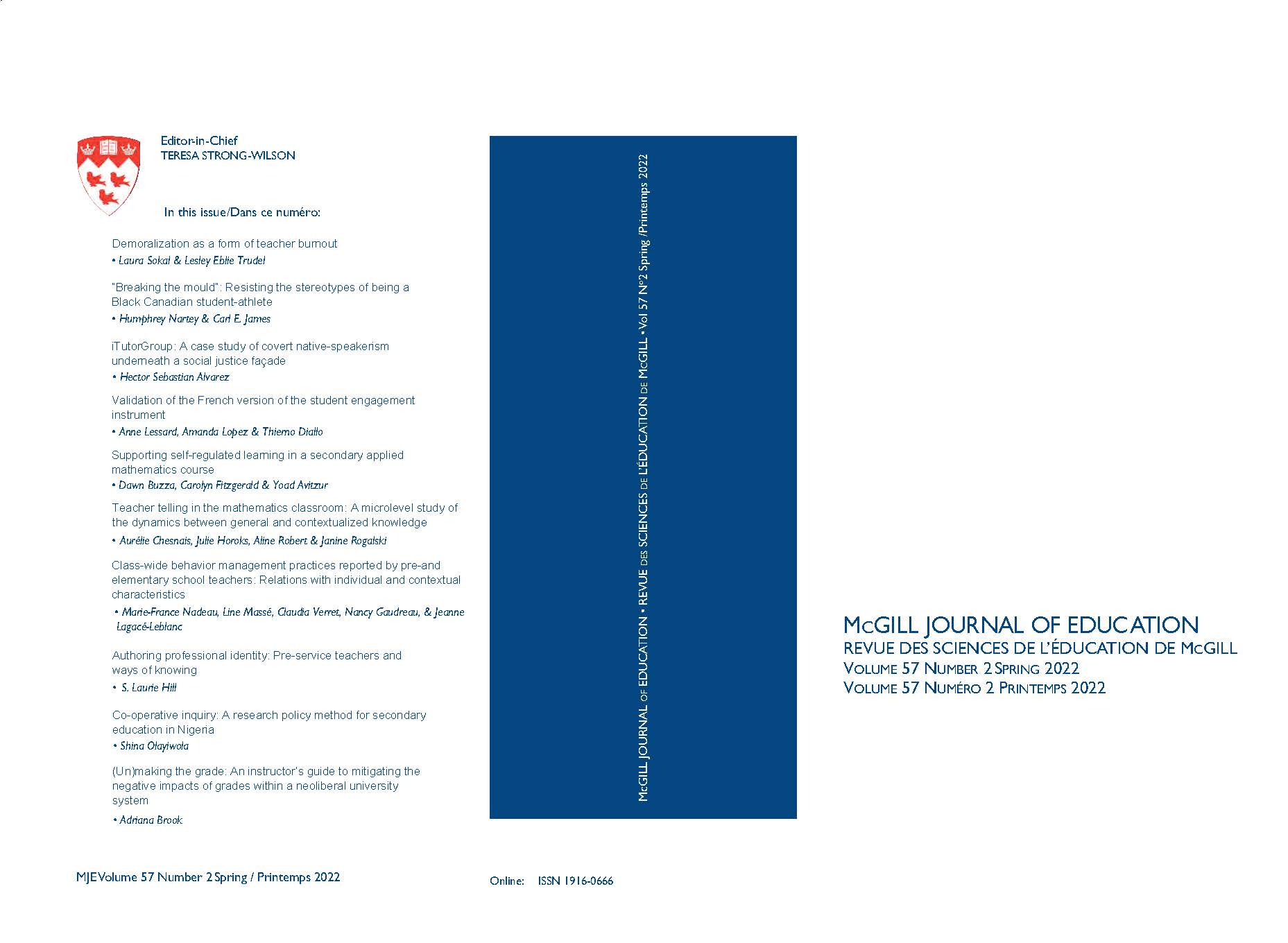Teacher telling in the mathematics classroom: A microlevel study of the dynamics between general and contextualized knowledge
Keywords:
teaching practices, teacher telling, students’ activity, secondary school mathematics, generalization, whole class scaffolding, activity theory, double approachAbstract
In this article, we analyze moments of teacher telling (MTT) involving the exposition of new knowledge to students. We first specify the theoretical framework used for our analyses and describe our global methodology, focusing on teacher telling moments as taking part in the students’ mathematics learning. Then, we review the literature on this topic and develop a specific tool, called a “proximity,” to study MMTs in relation to whole-class scaffolding. Finally, we compare two high school teachers’ practices in teaching the same content — variation of functions for 10th grade students — to illustrate this new analytical lens. In the conclusion, we discuss our approach and develop several research perspectives.
References
Abboud, M., Robert, A., & Rogalski, J. (2020). Educating mathematics teacher educators: The transposition of didactical research and the development of researchers and teachers educators. In K. Beswick & O. Chapman (Eds.), International handbook of mathematics teacher education: Vol. 4. The mathematics teacher educator as a developing professional (2nd ed., pp. 131–156). Brill.
Bakker, A., Smit, J., & Wegerif, R. (2015). Scaffolding and dialogic teaching in mathematics education: Introduction and review. ZDM – Mathematics Education, 47(7), 1047–1065. https://doi.org/10.1007/s11858-015-0738-8
Baxter, J. A., & Williams, S. (2010). Social and analytic scaffolding in middle school mathematics: Managing the dilemma of telling. Journal of Mathematics Teacher Education, 13(1), 7–26. https://doi.org/10.1007/s10857-009-9121-4
Bills, L., Dreyfus, T., Mason, J., Tsamir, P., Watson, A., & Zaslavsky, O. (2006). Exemplification in mathematics education. In J. Novotná, H. Moraová, M. Krátká, & N. Stehliková (Eds.), Proceedings of the 30th Conference of the International Group for the Psychology of Mathematics Education: Vol. 1. Plenaries, research forums, discussion groups, working session, short oral communications, posters (pp. 126–154). PME.
Bridoux, S., Grenier-Boley, N., Hache, C., & Robert, A. (2016). Les moments d'exposition des connaissances en mathématiques, analyses et exemples. Annales de didactiques et de sciences cognitives, 21, 187–233. https://doi.org/10.4000/adsc.813
Bruner, J. S. (1983). Le développement de l'enfant : Savoir faire, savoir dire. PUF.
Chappet-Pariès, M., Pilorge, F., & Robert, A. (2017a). Un scénario de formation de formateurs : Les activités d’introduction, les moments d’exposition des connaissances et les capsules pour la classe inversée, s’appuyant sur le thème « sens de variation des fonctions » en seconde. Document pour la formation des enseignants (No. 16). IREM Université Paris Diderot. http://docs.irem.univ-paris-diderot.fr/up/IPS17004.pdf
Chappet-Pariès, M., Pilorge, F., & Robert, A. (2017b). Pour étudier le dispositif classe inversée : Analyses des moments d'exposition des connaissances en classe et de capsules vidéos. Petit x, 105, 37–72. https://irem.univ-grenoble-alpes.fr/revues/petit-x/consultation/numero-105-petit-x/4-pour-etudier-le-dispositif-classe-inversee-analyses-des-moments-d-exposition-des-connaissances-en-classe-et-de-capsules-videos--505542.kjsp
Chesnais, A., (2011). Apprentissages en mathématiques en sixième : Contextes différents, pratiques différentes et inégalités. Revue française de pédagogie, 176, 57–72. https://doi.org/10.4000/rfp.3162
Engeström, Y., & Sannino, A. (2010). Studies of expansive learning: Foundations, findings and future challenges. Educational Research Review, 5(1), 1–24. https://doi.org/10.1016/j.edurev.2009.12.002
Horoks, J. (2006). Les triangles semblables en classe de 2nde : Des enseignements aux apprentissages : Étude de cas [Doctoral dissertation, Paris 7]. https://hal.science/tel-01136889v1/file/th%C3%A8se%20HOROKS.pdf
Horoks, J., & Robert, A. (2007). Tasks designed to highlight task-activity relationships. Journal of Mathematics Teacher Education, 10(4–6), 279–287. https://doi.org/10.1007/s10857-007-9040-1
Leontiev, A. N. (1978). Activity, consciousness, and personality. Prentice Hall. (Original work published 1972)
Lobato, J., Clarke, D., & Ellis, A. B. (2005). Initiating and eliciting in teaching: A reformulation of telling. Journal for Research in Mathematics Education, 36(2), 101–136. https://doi.org/10.2307/30034827
Mason, J., & Pimm, D. (1984). Generic examples: Seeing the general in the particular. Educational Studies in Mathematics, 15(3), 277–289. https://doi.org/10.1007/BF00312078
Potari, D., & Jaworski, B. (2002). Tackling complexity in mathematics teaching development: Using the teaching triad as a tool for reflection and analysis. Journal of Mathematics Teacher Education, 5, 351–380. https://doi.org/10.1023/A:1021214604230
Robert, A. (2012). A didactical framework for studying students’ and teachers’ Activities when learning and Teaching Mathematics. International Journal for Technology in Mathematics Education, 19(4), 153–158.
Robert, A., & Rogalski, J. (2005). A cross-analysis of the mathematics teacher’s activity: An example in a French 10th-grade class. Educational Studies in Mathematics, 59, 269–298. https://doi.org/10.1007/s10649-005-5890-6
Robert, A., & Rogalski, J. (2020). D’un problème d’optimisation d’une surface agricole au cours sur le sens de variation en seconde : Une étude de cas. Cahiers du laboratoire de didactique André Revuz (No. 22). IREM Université Paris Diderot. http://docs.irem.univ-paris-diderot.fr/up/publications/IPS20009.pdf
Robert, A., & Vandebrouck, F. (2014). Proximités-en-acte mises en jeu en classe par les enseignants du secondaire et ZPD des élèves : Analyses de séances sur des tâches complexes. Recherches en Didactique des Mathématiques, 34(2–3), 239–285. https://revue-rdm.com/2014/proximites-en-acte-mises-en-jeu-en/
Rogalski, J. (2013). Theory of activity and developmental frameworks for an analysis of teachers’ practices and students’ learning. In F. Vandebrouck (Ed.), Mathematics classroom: Students’ activities and teacher’s practices (pp. 3–23). Sense Publishers.
Simon, M. (2013). The need for theories of conceptual learning and teaching of mathematics. In K. R. Leatham (Ed.), Vital directions for mathematics research (pp. 95–118). Springer.
Smit, J., van Eerde, H. A. A., & Bakker, A. (2013). A conceptualisation of whole-class scaffolding. British Educational Research Journal, 39(5), 817–834. https://doi.org/10.1002/berj.3007
Smith, J. P., III. (1996). Efficacy and teaching mathematics by telling: A challenge for reform. Journal for Research in Mathematics Education, 27(4), 387–402. https://doi.org/10.5951/jresematheduc.27.4.0387
Stein, M. K., Engle, R. A., Smith, M. S., & Hughes, E. K. (2008). Orchestrating productive mathematical discussions: Five practices for helping teachers move beyond show and tell. Mathematical Thinking and Learning, 10(4), 313–340. https://doi.org/10.1080/10986060802229675
Vygotsky, L. (1978). Mind in society: The development of higher psychological processes. Harvard University Press.
Wood, D., Bruner, J., & Ross G. (1976). The role of tutoring in problem solving. Journal of Child Psychology and Psychiatry, 17(2), 89–100. https://doi.org/10.1111/j.1469-7610.1976.tb00381.x
Published
How to Cite
Issue
Section
License
Copyright (c) 2023 McGill Journal of Education / Revue des sciences de l'éducation de McGill

This work is licensed under a Creative Commons Attribution-NonCommercial-NoDerivatives 4.0 International License.



